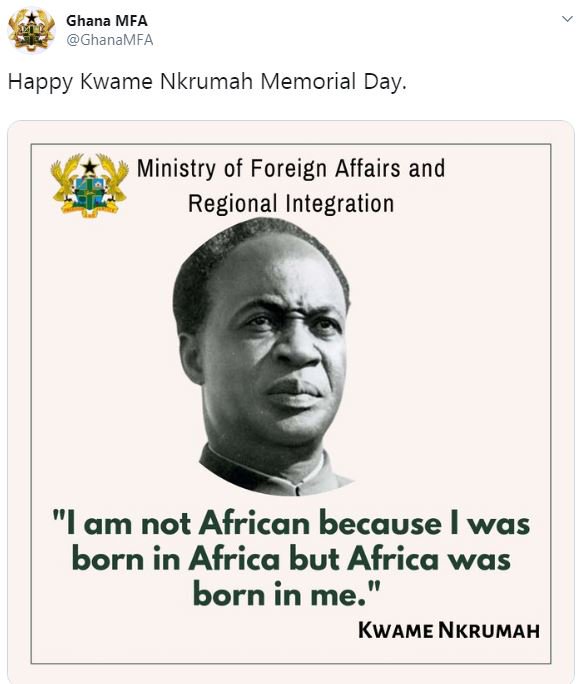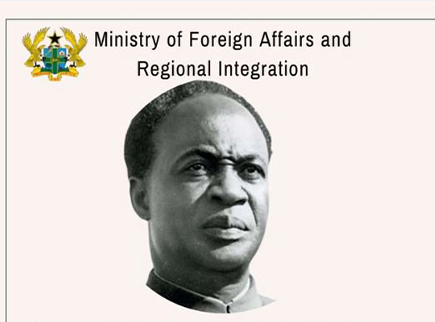As Ghana marks the birthday of Osagyefo Dr. Kwame Nkrumah, an agricultural expert says revitalizing farmlands and achieving food self-sufficiency would be the most meaningful way to honour the country’s founding President’s enduring legacy.
Dr. Amos Rutherford Azinu, Founder and Chief Executive Officer of the Legacy Crop Improvement Centre, stated that Dr. Nkrumah’s agricultural foresight remains one of the most underappreciated pillars of Ghana’s independence and development agenda.
In a statement copied to the Ghana News Agency, Dr. Azinu said, “While we remember Nkrumah’s political achievements and pan-African ideals, perhaps the most fitting tribute we can offer this great man lies not in speeches or monuments, but in the fertile soils and flowing waters he helped create for future generations.”
He noted that the Volta River Project, conceived and executed in the 1960s, was not merely a dam-building exercise but a strategic investment in agricultural transformation.
“The creation of Lake Volta was a masterstroke of long-term thinking that provided the foundation for irrigation, fishing, and rural development that could have fed and enriched the nation for generations,” he said.
He added that the Akosombo Dam and the Volta River Authority were designed not only to generate electricity but to anchor food security, rural prosperity, and economic diversification.
“Nkrumah saw agriculture not as a backward sector to be abandoned in pursuit of industrialisation, but as the bedrock upon which a modern Ghana could be built,” he said.

Dr. Azinu expressed concern that Ghana currently imports billions of dollars’ worth of food annually, despite possessing the infrastructure and natural resources to produce much of it domestically.
“We import rice while our irrigation systems lie underutilised. We import tomatoes while our farmers struggle with post-harvest losses. We import fish while Lake Volta, Nkrumah’s gift to the nation, holds untapped aquaculture potential,” he said.
He argued that the most meaningful way to honour Nkrumah’s birthday was not through statues or renamed streets, but through a national commitment to complete his agricultural vision.
“This is not the Ghana that Nkrumah envisioned when he invested the nation’s resources in creating the infrastructure for agricultural abundance,” he said.
Dr. Azinu outlined four key areas for action, beginning with the need to maximize the Volta River’s potential.
He said, “Modern irrigation techniques, coupled with improved seeds and farming practices, can multiply crop yields and create year-round farming opportunities.”
He emphasized that irrigation systems fed by the Volta could transform Ghana’s northern regions into a national food basket.
Secondly, he called for greater investment in rural infrastructure, noting that Nkrumah understood agriculture required more than farming alone.
“It needed roads, storage facilities, processing centres, and market access. Today’s Ghana must complete this infrastructure web to reduce post-harvest losses and increase farmers’ incomes,” he said.
Dr. Azinu also stressed the importance of supporting smallholder farmers, who produce most of Ghana’s food.
“These farmers are the inheritors of Nkrumah’s agricultural vision,” he said, urging that they be empowered with access to credit, technology, and markets.
Finally, he encouraged policymakers to embrace modern technology in agriculture, stating: “Nkrumah was never afraid of embracing new technology for national development. Today’s agricultural revolution must follow that example.”
He advocated for the adoption of precision farming, climate-smart techniques, and digital platforms.
Dr. Azinu pointed out that Ghana spends over $2 billion annually on food imports, and that redirecting even a portion of this spending toward domestic agricultural development would create jobs, reduce foreign exchange pressures, and move the nation closer to food security.
“The rice fields that could flourish under irrigation from Lake Volta, the vegetable farms that could supply our cities, the fish farms that could stock our markets; these represent not just economic opportunities, but the fulfilment of a founding father’s dream,” he said.
He added that climate change and global supply chain disruptions had made Nkrumah’s vision of agricultural self-reliance more urgent than ever.
“The infrastructure he built; the dams, the lake, the river systems, remain as relevant today as they were sixty years ago,” he said.
Dr. Azinu called on Ghanaians to honour Nkrumah not only in memory but in action, saying: “Let us transform his agricultural infrastructure into agricultural abundance. Let us turn his vision of a self-reliant Ghana into the reality of a food-secure nation.”
He noted that the greatest monument to Kwame Nkrumah would not be built of stone and bronze, but of thriving farms, prosperous rural communities, and a Ghana that feeds itself from its own fertile soil.
“The seeds of greatness that Nkrumah planted in Ghana’s soil await only our commitment to tend them into harvest,” Dr. Azinu said.

